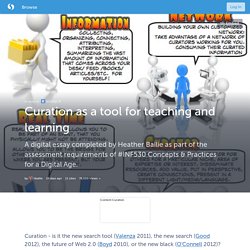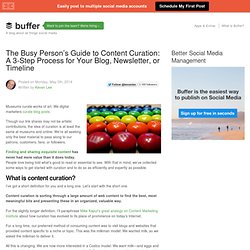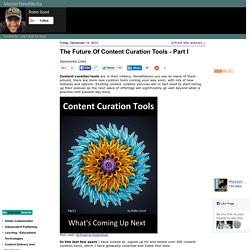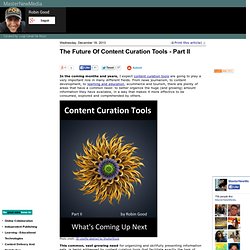

Curation as a tool for teaching and learning (with images) · hbailie. “A curator is an expert learner.

Instead of dispensing knowledge, he creates spaces in which knowledge can be created, explored, and connected.” (Siemens, 2007). According to Boyd (2010) curators help people to focus their attention on the most relevant and important information streams. Valenza (2011) tells us to take advantage of the work of others passionate about a topic and use their curated work as a search tool. Fiorelli (2011) describes content curators as “critical knowledge brokers”. The Busy Person's Guide to Content Curation: A 3-Step Process.
841 Flares Filament.io 841 Flares × Museums curate works of art.

We digital marketers curate blog posts. Though our link shares may not be artistic contributions, the idea of curation is at least the same at museums and online: We’re all seeking only the best material to pass along to our patrons, customers, fans, or followers. Finding and sharing exquisite content has never had more value than it does today. People love being told what’s good to read or essential to see. What is content curation? I’ve got a short definition for you and a long one. Content curation is sorting through a large amount of web content to find the best, most meaningful bits and presenting these in an organized, valuable way. For the slightly longer definition, I’ll paraphrase Mike Kaput’s great analogy on Content Marketing Institute about how curation has evolved to its place of prominence on today’s Internet.
All this is changing. Here’s how Mike Kaput summarizes the story: Curation is not aggregation. 1. 2. The Seven Needs of Real-Time Curators. I keep hearing people throw around the word “curation” at various conferences, most recently at SXSW.

The thing is most of the time when I dig into what they are saying they usually have no clue about what curation really is or how it could be applied to the real-time world. So, over the past few months I’ve been talking to tons of entrepreneurs about the tools that curators actually need and I’ve identified seven things. First, who does curation? Bloggers, of course, but blogging is curation for Web 1.0. Look at this post here, I can link to Tweets, and point out good ones, right?
But NONE of the real time tools/systems like Google Buzz, Facebook, Twitter, YouTube, Flickr, give curators the tools that they need to do their work efficiently. As you read these things they were ordered (curated) in this order for a reason. This is a guide for how we can build “info molecules” that have a lot more value than the atomic world we live in now. A curator is an information chemist. 1. 2. 3. 4. Alone / Together - How we Find, Read, share & Publish.
Curate SXSW. Introduction to Social Media Curation. Content Curation Visualized. How to be an effective digital curator - what to expect. The Discipline of Organizing. The Future Of Content Curation Tools - Part I. Content curation tools are in their infancy.

Nonetheless you see so many of them around, there are more new curation tools coming your way soon, with lots of new features and options. Existing content curation services will in fact need to start rolling up their sleeves as the next wave of offerings will significantly go well beyond what is possible with present day tools Photo credit: 3D Flower by ShutterStock In this last few years I have looked at, signed up for and tested over 400 content curation tools, which I have gradually collected and listed first here: The NewsMaster Toolkit and hereBest News Curation Tools for Independent Publishers then here on Mindomo: Content Curation Tools: Newsmaster Toolkit 2012 from July 2013 here on Pearltrees: Content Curation Tools Supermap and from September 2013 a simplified version here: Content Curation Tools Directory As a small independent author and publisher, I curate content on a daily basis, since 2005. 2) Slicing and Dicing 3) Micro - Macro.
The Future Of Content Curation Tools - Part II. -> continued from Part I - Future of Content Curation Tools 8) Preservation Contrary to popular belief, the nature of the web is quite volatile.

A large percentage of the overall content available online, is moved, taken down, deleted or disappears on a daily basis, at times only because the website owner has no more money to pay his hosting bills. If you run a check for broken links on your web site you will see what I am talking about. How many times have you run through a list of tools on a blog post, only to find that a bunch of them were not available anymore? How many startups are created and how many them survive after one or two years (and with them their websites and blogs)?
Even without you as a publisher doing anything wrong, the links you create, pointing to other sites, tools and information, do disappear. This is the life of content on the Internet.